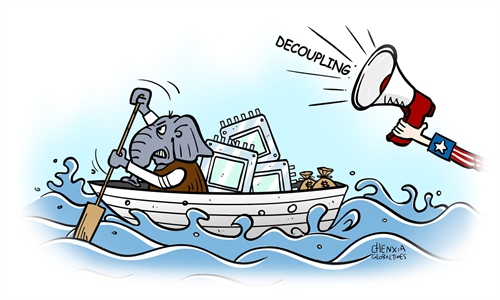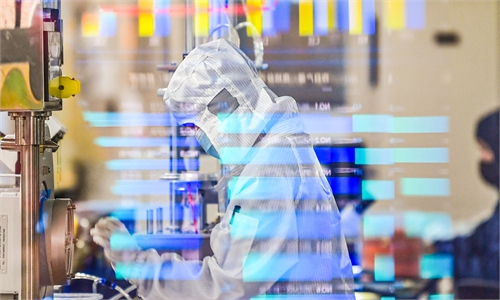Washington kidnaps allies to squeeze China on chips; new curbs to strengthen pace of China’s tech rise
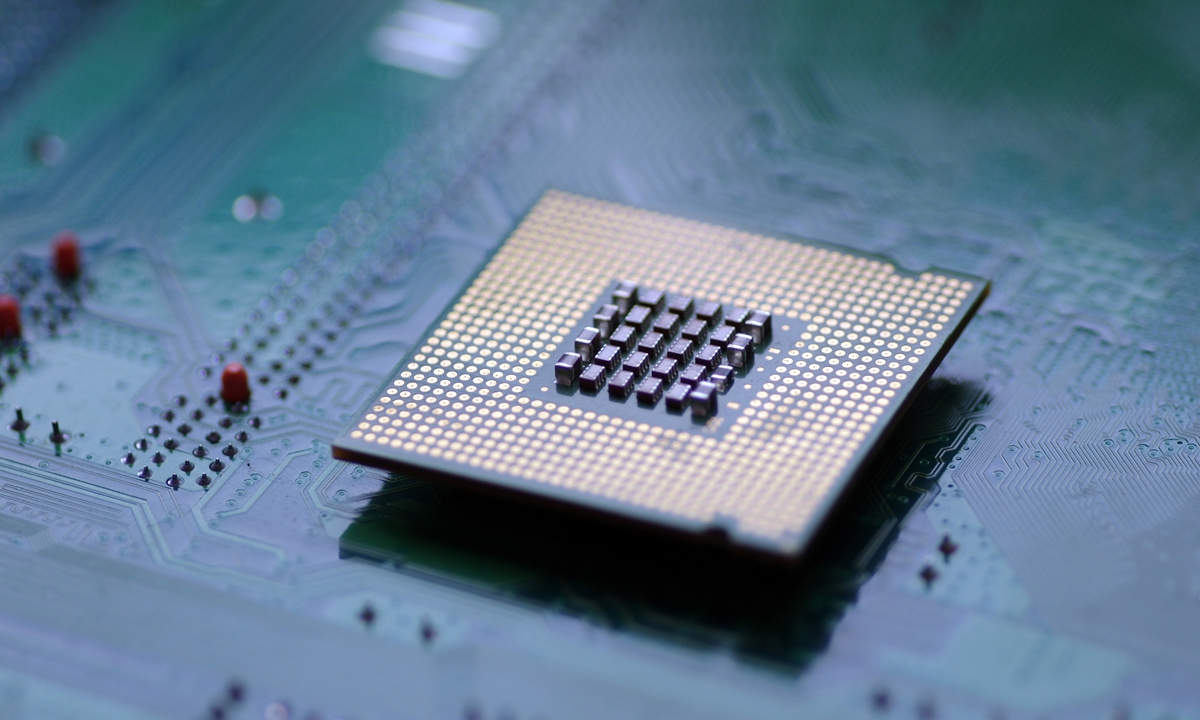
Photo:VCG
The US is reportedly considering new curbs to hobble China's semiconductor progress by utilizing long-arm jurisdiction, abusing export rules and coercing allies into further restricting sales of critical high-end chipmaking tools that are key for China's technological rise.
The latest move underscores the US' desperation in stepping up efforts to hold back China's technological ascent after a years-long crackdown did not appear to have much effect, observers noted, while warning that a wider involvement of key firms such as ASML in the industry may deal a further blow to the already fragile global industrial chain.
On Friday, the Dutch government announced a ministerial order restricting exports of certain advanced semiconductor equipment, and though the Netherlands claimed the measures were "country-neutral," it's widely believed to have come under accelerated pressure from the US, targeting specific countries like China.
Moreover, the US is expected to go one step further on the Netherlands' move and use its long reach to withhold even more Dutch equipment from specific Chinese fabs this summer, according to a Reuters report on Friday, which described the measures as "one-two punch" to China's chipmakers.
This is an intensified siege on China's semiconductor industry, indicating that the US is now extending its crackdown from advanced process chips to mature ones above 14 nanometers, Ma Jihua, founder of Beijing DARUI Management Consulting Co, told the Global Times on Friday.
At a routine press conference held by the Chinese Ministry of Foreign Affairs on Friday, spokesperson Mao Ning voiced China's firm opposition to the US' reported action, which "overstretches the national security concept and abuses export controls."
"The US, under various pretexts, is attempting to cajole or coerce other countries into joining its technological blockade against China, and is intervening in normal economic and trade exchanges between companies through administrative means. This behavior seriously undermines market rules and the international economic and trade order, and disrupts the stability of the global industrial and supply chain, which is not in the interests of any party," Mao said.
China will pay close attention to the relevant developments and resolutely safeguard its legitimate rights and interests, the official noted.
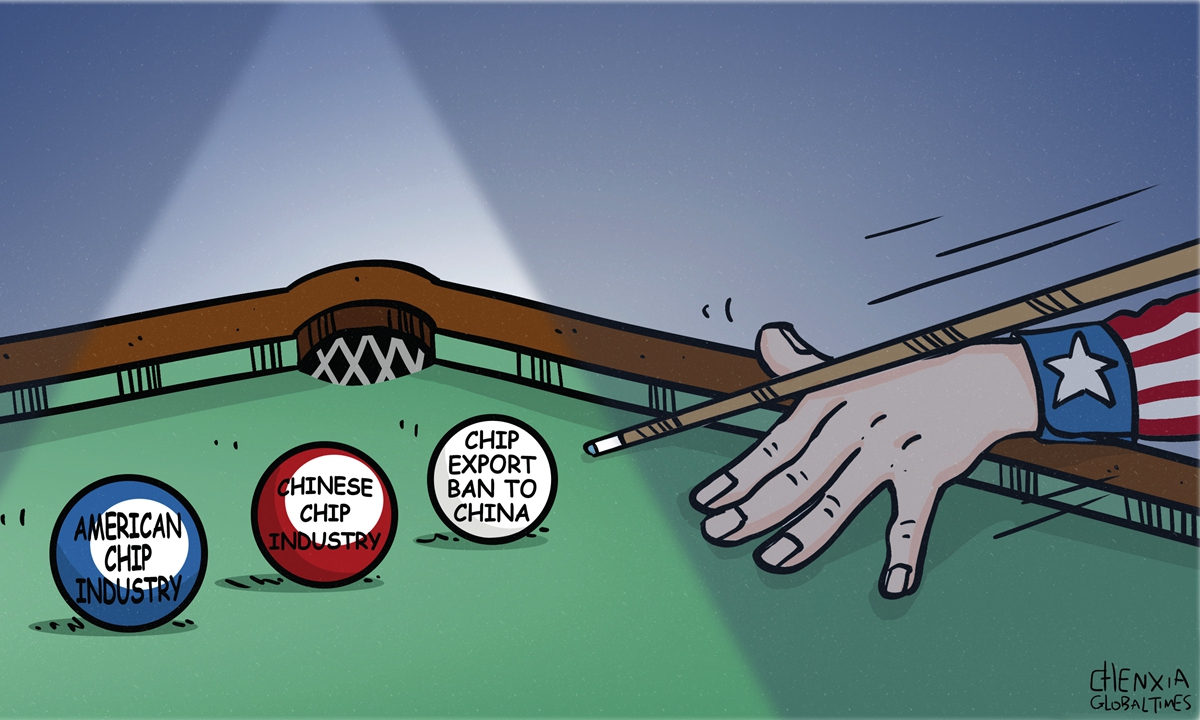
Illustration: Chen Xia/GT
US pressure
"We've taken this step on national security grounds," Dutch Minister for Foreign Trade and Development Cooperation Liesje Schreinemacher said in the Friday statement.
The Netherlands' imposition of arbitrary restrictions under the pretext of "national security" is groundless and lacks any legal or moral basis. This behavior not only harms the legitimate rights and interests of Chinese companies but also causes losses to Dutch companies, Chinese Embassy to Netherlands said in a statement on Friday.
"It constitutes an abuse of export control measures and a serious departure from the principles of free trade and international trade rules. China firmly opposes such actions," the embassy said.
Under the new rule launched by Dutch government, it will now be necessary for ASML, the world's exclusive maker of cutting-edge chip equipment, to apply for an export authorization for the export of certain types of advanced semiconductor manufacturing equipment.
Due to these export control regulations, ASML will need to apply for export licenses with the Dutch government for all shipments of its most advanced immersion DUV lithography systems, the company said in a statement to the Global Times on Friday.
The company said it will continue to comply with applicable export regulations, including Dutch, EU and US regulations, while expecting that these measures won't have "a material impact" on its financial outlook that it published for 2023.
In an interview with Reuters in January, CEO Peter Wennink said orders from Chinese firms make up about 15 percent of the company's 40 billion euro order backlog.
"The move is obviously not a good signal, will inevitably impact China-Netherlands trade cooperation, and may meanwhile even pose challenges to the existing cooperation foundation between China and Europe," Cui Hongjian, director of the Department of European Studies at the China Institute of International Studies, told the Global Times on Friday.
Chinese Premier Li Qiang recently wrapped up his visit to Germany and France on June 24, his first overseas visit since taking up his position. During his trip, Li stressed that China will continue to open up and improve its business environment, and called on China and Europe to rise above differences, demonstrating the importance China attaches to the European market in an era of heightening geopolitical tensions.
Overall, the relationship between China and Europe is unlikely to experience significant setbacks, but under the US' "carrot and stick" approach, temporary turbulence could occur, and firms like ASML might be forced to bear the losses of these conflicts, Cui said.
"It's important for both Europe and China to strike a balance," Cui said.
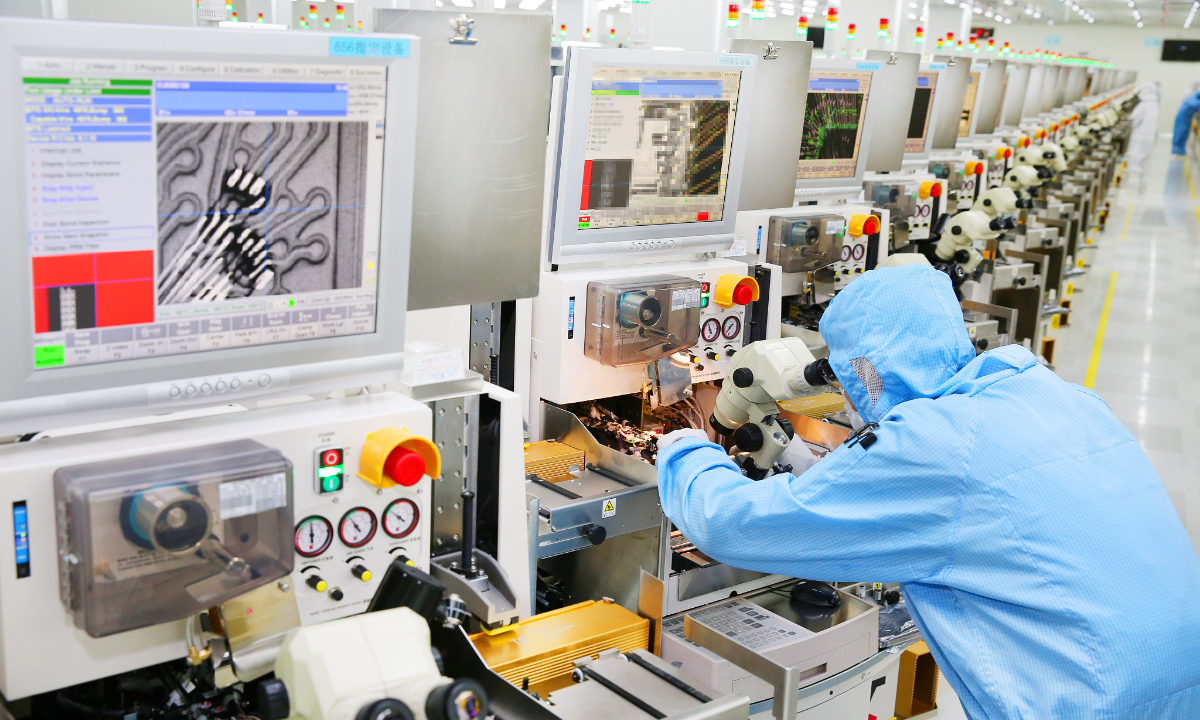
An engineer analyzes chips at a chip factory in Nantong, East China's Jiangsu Province in February. Photo: VCG
Rise under sanction
Industry players told the Global Times that over the past five years, Washington's intensified sanctions have put up barriers to the industry's development, but have also strengthened their resolve and capability in achieving self-reliance in high technologies.
They believe it's also the same this time round.
"We expect some effects, but not to the extent that it will drastically disrupt our operations in the automotive electronics field," a manager with a domestic auto chip company told the Global Times on condition of anonymity on Friday.
The latest move by the US and Dutch authorities is essentially a continuation of the US policy of decoupling from China, the manager said, adding that in the domestic automotive electronics industry, they are taking a steady approach and haven't reached a point where they cannot function without imported chips.
"Instead, we are confident that we are still able to make progress without relying heavily on these imported chips," he said.
Regarding efforts to mitigate the situation, the manager said that domestic chip companies, including itself, are continuously improving their self-capabilities and developing AI-based products with increased computing power.
"The widespread adoption or diversification of domestically produced products is just the first step. The second step should involve creating our own competitive and distinctive products that demonstrate our unique advantages," the manager added.
According to multiple media reports, including the Wall Street Journal and Financial Times, US officials are also mulling tightening export curbs announced in October to restrict the sale of some AI chips to China.
"If the US continues to insist on these 'decoupling' measures, they should be afraid of the rise of more rivals that will replace them in the world's second-largest economy," Gao Lingyun, an expert at the Chinese Academy of Social Sciences (CASS) in Beijing, told the Global Times on Friday.
In a recent interview with the Financial Times, Nvidia Chief Executive Jensen Huang said that the existing export controls could cause "enormous damage" to the US tech industry.
Huang said they had left his company with their "hands tied behind our back" by preventing Nvidia from selling its most advanced chips to China, the Financial Times reported.

